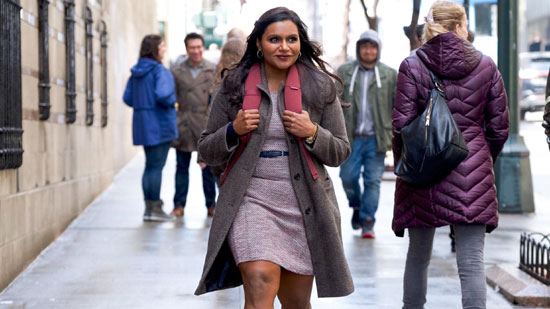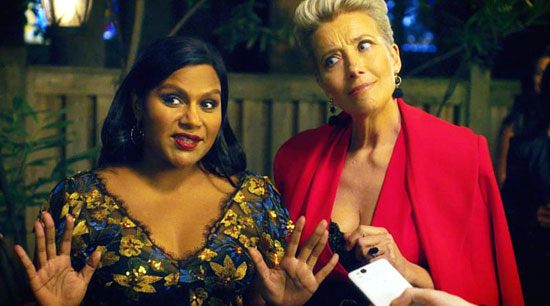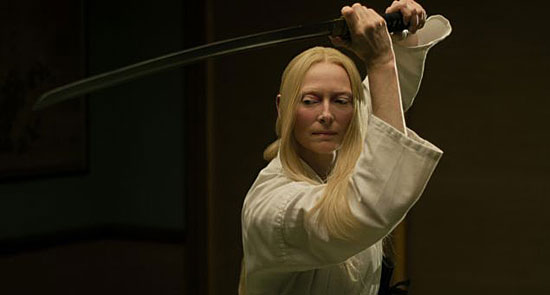|
There is barely such a thing as a woman host of a late-night talk show, at least in the U.S. Samantha Bee—the only current one—was rightfully irked when a Vanity Fair cover photo included all her male late-night competitors, but not her. (Bee’s solution was to superimpose herself in the photo as a centaur with laser-beam eyes.)
Emma Thompson, star of Nisha Ganatra’s film Late Night, refers to the movie’s plot, only half-jokingly, as “science fiction.” Mindy Kaling, the screenwriter of Late Night and Thompson’s co-star, may have written what qualifies as a fantasy, but it is a fantasy that smacks of truth, even if we’ve seen some of its plot before.
Katherine Newbury (Thompson) has been the host of a late-night show for 28 years. We see her at the beginning of Late Night accepting the Mark Twain Humor Prize at the Kennedy Center, the absolute zenith of the comedy profession. Yet there is trouble in Newbury’s seemingly secure world: her ratings have been sliding for some time, she is constantly accused of being “irrelevant,” and Caroline Morton (Amy Ryan), her hard-as-nails boss at the network, is itching to replace Newbury with aggressively unfunny but popular comic Danny Tennant (Ike Barinholtz).
We see that working for nearly three decades in an overwhelmingly macho world has hardened Newbury just as much as Morton. She is cold, snippy, impersonal, not bothering to learn the names of her all-male writing staff (she gives them numbers instead). Of course, the writers all have a sense of entitlement that irks Newbury no end. She takes positive joy in firing the writer who not so much requests as demands a raise because his wife is expecting a baby. Yet we also see that Newbury has redeeming characteristics, especially in her relationship with her husband Walter (John Lithgow), a distinguished musician recently diagnosed with Parkinson’s disease.
 |
Into this den of wolves comes a lamb named Molly Patel (Kaling). Hired as part of a diversity program by the network, Molly has never done professional comedy before, unless you can count the jokes she told on the floor of the chemical plant where she worked. Faced with Newbury’s coldness and the hostility of the other writers, Molly at first doesn’t even rate her own chair in the conference room, but has to sit on an upturned wastebasket.
Assigned to work on Newbury’s opening monologue with longtime writer Tom Campbell (Reid Scott), Molly gets hostility from Tom, kind and fatherly advice from older writer Burditt (Max Casella), and mixed signals from Charlie Fain (Hugh Dancy), the playboy on the staff, who may or may not be interested in her.
Molly slowly works her way into the good graces of Newbury, who never previously admitted to having good graces. Thanks to Molly, Newbury loosens up on camera, presenting a warmer, more relatable side of her personality. Ratings climb, as does Molly’s status. However, a leaked email soon threatens Newbury’s career and marriage, and partly in consequence she hardens her heart against Molly.
 |
Everything, of course, ends happily. Kaling has a sure hand with dialogue, yet the structure of the story seems overly familiar, including a major (and not terribly believable) change of heart from one of the supporting characters. Nevertheless, Late Night is worth seeing, because of Kaling and especially Thompson. Kaling is a performer of great warmth and appeal, and Thompson simply commands the screen. An amalgam of Miranda Priestly and Thompson’s own P.L. Travers from Saving Mr. Banks, Katherine Newbury can kill at twenty paces with a well-aimed insult. Thompson presents Newbury’s elegant, bristling wit, but also makes us see it as a weapon she had to learn to use in combat with the male chauvinist warriors who surrounded her throughout her career. This combativeness bled into Newbury’s life,
and it took Molly to help her regain her humanity—or, if you prefer, her sisterhood. It’s a familiar story, but it goes down easily, thanks to its stars.
Speaking of stars, Jim Jarmusch’s The Dead Don’t Die features a glittering array of indie-film royalty, many of them Jarmusch regulars. It’s too bad that Jarmusch has deployed them in the Greenwich Village equivalent of a Rat Pack confab, a two-hour-long in-joke that leaves the audience resolutely outside.
The Dead Don’t Die opens on the outskirts of Centerville, which advertises itself as “A Real Nice Place.” Sheriff Cliff Robertson (Bill Murray) and Deputy Ronnie Peterson (Adam Driver) have an inconclusive confrontation with accused chicken thief Hermit Bob (Tom Waits), who was Cliff’s middle school classmate long ago. Hermit Bob’s accuser is Farmer Miller (Steve Buscemi), whom Cliff and just about everybody else in town dislikes. (Farmer Miller wears a red hat with the logo, “Make America White Again.”)
On the way back to town, Cliff and Ronnie discuss weird things that have started happening. Daylight is lasting far longer than it should at that time of year; cell phones and watches have stopped working. They discuss polar fracking, which allegedly has thrown the earth off its rotational axis. Throughout, Ronnie heaps praise on a song playing on the radio—“The Dead Don’t Die,” by Sturgill Simpson.
“Why do you keep talking about that song?” Cliff asks.
“It’s the theme song,” Ronnie answers.
This is where Jarmusch clues you in: if you want a movie in which you care about the story and the characters, leave the theater. If you want a movie that will allow you to bask in the in-crowd glow of Tilda Swinton, Danny Glover, Chloe Sevigny, RZA, Iggy Pop, etc., sit right down. But you might want to forgo the popcorn when the bloodletting starts.
The Dead Don’t Die follows the traditional form for zombie movies set by Night of the Living Dead a half-century ago. The characters sit around discussing the strangeness that is starting to envelop them, punctuated by increasingly disturbing reports from TV reporter Posie Juarez (Rosie Perez), until suddenly the zombies arrive in force, ripping the limbs off the townsfolk. A trio of hipsters from Cleveland, led by Selena Gomez, show up in Centerville just in time to become zombie chow. In fact—and it’s not giving away any big secrets to say so—everyone in the movie ends up as zombie chow, except for one character who benefits from an intergalactic deus ex machina and another who is left to wax melancholy on the fate of the world.
Jarmusch does have some fun in the way he portrays the zombies. (The New Yorker’s Anthony Lane has already remarked on what a brilliant idea it was to cast Iggy Pop as one.) They are depicted as monomaniacs, moaning for whatever consumer goods obsessed them in life—Snickers, WiFi, video games. Iggy Pop’s character, a coffee hound, douses himself with a steaming pot; another, a zombie played by Carol Kane who was the town drunk in life, dies muttering, “Chardonnay.” One of the funniest scenes in the movie is a group of zombies clustered around a pharmacy, whispering, “Xanax.” (Most of the others involve Swinton, playing the town’s samurai-sword-wielding undertaker, taking vengeance on the zombie invaders, including two corpses in her embalming room who suddenly come to life.)
 |
Most of the rest of the humor in The Dead Don’t Die consists of in-jokes, the most glaring of which is when Swinton compliments Driver on his Star Wars keychain. Some critics have used the polar fracking and zombie consumerism angles, as well as the film’s closing monologue, to praise the film as a mordant satire of a world bent on destroying itself. But Jarmusch keeps an ironic, jaded distance from that message, or any other. In a word, he seems bored.
In an interview with Rolling Stone, Jarmusch said he thinks zombies are far less interesting than vampires, whom he describes as “fucking cool.” (Only Lovers Left Alive, his 2014 film starring Swinton and Tom Hiddleston, proves his point.) The Dead Don’t Die, Jarmusch said, had its origins in a line from Only Lovers Left Alive in which Swinton and Hiddleston remark that most humans are zombies, unconscious to the world around them. Sadly, that statement contains a grain of truth. I only wish The Dead Don’t Die wasn’t as disengaged as its subject.
|